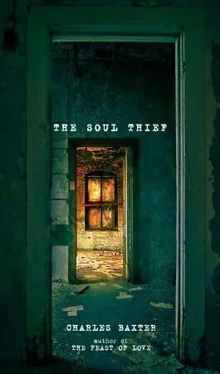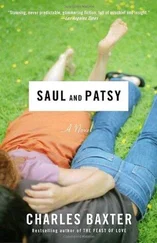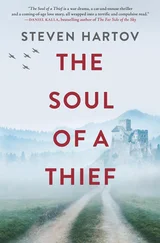Charles Baxter - The Soul Thief
Здесь есть возможность читать онлайн «Charles Baxter - The Soul Thief» весь текст электронной книги совершенно бесплатно (целиком полную версию без сокращений). В некоторых случаях можно слушать аудио, скачать через торрент в формате fb2 и присутствует краткое содержание. Год выпуска: 2008, Издательство: Vintage Books, Жанр: Современная проза, на английском языке. Описание произведения, (предисловие) а так же отзывы посетителей доступны на портале библиотеки ЛибКат.
- Название:The Soul Thief
- Автор:
- Издательство:Vintage Books
- Жанр:
- Год:2008
- ISBN:нет данных
- Рейтинг книги:4 / 5. Голосов: 1
-
Избранное:Добавить в избранное
- Отзывы:
-
Ваша оценка:
- 80
- 1
- 2
- 3
- 4
- 5
The Soul Thief: краткое содержание, описание и аннотация
Предлагаем к чтению аннотацию, описание, краткое содержание или предисловие (зависит от того, что написал сам автор книги «The Soul Thief»). Если вы не нашли необходимую информацию о книге — напишите в комментариях, мы постараемся отыскать её.
The Soul Thief — читать онлайн бесплатно полную книгу (весь текст) целиком
Ниже представлен текст книги, разбитый по страницам. Система сохранения места последней прочитанной страницы, позволяет с удобством читать онлайн бесплатно книгу «The Soul Thief», без необходимости каждый раз заново искать на чём Вы остановились. Поставьте закладку, и сможете в любой момент перейти на страницу, на которой закончили чтение.
Интервал:
Закладка:
Perhaps they have brought her here.
“I’m not a devil,” Nathaniel says to Theresa.
“Well, it’s his story,” Theresa informs him, rubbing down her calves, “and he’ll decide what you are. You present various temptations, don’t you? In the meantime he’s wearing your shirts and your shoes.” She takes his hand. “I don’t see why you have a problem with that.”
“Ever heard of private property? Ever heard of theft? Besides, where has he been? I haven’t seen him lately. It’s as if he’s been hiding,” Nathaniel says, releasing her hand but keeping his eye on her legs, which are ostentatiously long and smooth-muscled. “He doesn’t answer the phone and he doesn’t seem to live in the building where I thought he lived.”
“Nothing dates like the past,” Theresa says with a slow drag on the word “past,” as if this exposition were all old, tedious information with which she couldn’t be bothered.
“Well, where is he, then?”
Theresa points. “Coolberg? He’s right over there.”
In the distance, through the pedestrian avenue between cages and the shuttered popcorn stand, is a bench on which Coolberg sits, facing them, one arm flung back. Theresa has conjured him out of nothing. When Nathaniel sees him, Coolberg raises his eyes from the book he’s reading and meets Nathaniel’s gaze, quizzically. The gaze turns into another stare. Some sort of telepathy has informed him that now is the moment for the exchange of glances. Under his unzippered jacket, the Brooks Brothers shirt he wears does not quite fit him, and the trousers need alteration, downward, about a half inch. The shoes appear to fit perfectly.
“You arranged this,” Nathaniel says. “You planned this out and arranged this.”
“Oh, no,” she replies. “The totally empty zoo? An accident. The bored sleeping animals? A mere coincidence. Don’t call me a bitch before you’re ready to back it up.”
“I never called you a bitch. I never did that.” The outside air has the enclosed noncirculatory staleness of a cedar closet, and Nathaniel feels his hands closing up into clenched fists. As he runs toward Coolberg, he hears Theresa say something whose exact words he can’t make out. But the sentence sounds like “ Don’t hit him.”
When he arrives in front of Coolberg, Nathaniel says, “Stand up.”
“Hi, Nathaniel. Ever read this?” He holds up a book entitled The Wandering Beggar.
“No. Stand up.”
“Why?” He seems puzzled. “I’m glad to see you.”
“Stand up so I can slug you.”
“What good would that do? If you hit me, nothing would really happen.”
“Something would happen. I’d feel good.”
“Oh, but you’re not like a character in a movie. Why act like one? That’s a movie line. You keep underestimating yourself. You make yourself into less than you are. Well, you can hit me if you really want to, I suppose. I suppose you have the moxie for it. And by the way, I’m going to return your clothes and this pair of shoes in a few days, you know. I was always going to return them. I just needed them for a while.”
“Stand up.”
“Don’t be that way. Ah, here’s Theresa.” Coolberg does indeed stand up as Theresa joins them. She’s humming “Here Comes the Sun” in a high cheerful soprano. For some reason, her hands are crossed over her breasts. Ignoring her, Nathaniel hauls back and swings his fist into Coolberg’s stomach. But Coolberg is an unsatisfactory victim, and the sensation is oddly like punching a Bozo the Clown doll. Nathaniel’s fist meets little or no resistance, as if the fogged-in body it struck had anticipated and already made a place for the fist, accommodating this and every other occasion of physically intrusive violence, with fog. Nevertheless, Coolberg gasps and falls back onto the bench. The strangest part of it is that Theresa does not stop humming the Beatles tune as she reaches around Nathaniel to keep him from swinging his fist again. But how would he hit a man sitting on a park bench anyway? One blow must suffice.
“Okay…now you’ve done that…sit down.” Coolberg gasps.
After what seems to be a blank, a blackboard of empty space and time suddenly inscribed with a few chalky words of instruction that vanish as soon as they have appeared, Nathaniel finds himself sitting on the bench next to Coolberg. Despite his intention to leave these confounding people at the zoo and to drive home, here he is nevertheless, their straight man. Around Coolberg, good intentions have a negligible effect. Coolberg, the recipient of Nathaniel’s sudden attack, appears to have resumed reading The Wandering Beggar and now obligingly begins a plot summary. In the meantime Theresa has maneuvered her body, and herself, behind the two men and has one hand on Coolberg’s shoulder and another hand on Nathaniel’s. Her puppeteer fingers — she wears bright maroon nail polish — have him in a controlling grip. They rise and begin to caress his neck.
I love these stories, Coolberg says. They’re about the adventures of Simple Shmerel, who travels from village to village. It’s almost like The Arabian Nights.
Theresa kneads Nathaniel’s shoulder. Then her finger-tips move up to his earlobes.
This story, the one I’m reading now, is about Calman, the rich merchant, and Zalman, his coachman.
“I’m leaving,” Nathaniel says.
Zalman is a good coachman, honest and sober. He even goes to bed early. But he has a vice: he imitates his master. For instance, he walks with his hands clasped behind his back in a thoughtful posture, like Calman’s own attitude and bearing when walking, and he imitates his master’s tone of voice and uses many of the same words and expressions.
“Let go of me,” Nathaniel says.
One day Zalman steals Calman’s clothes and begins to wear them. Now no one can tell Zalman and Calman apart, so alike do they appear. The two of them, master and man, are indistinguishable even to those who know them. Both have glossy black beards and brown eyes. Zalman begins to give orders to Calman, and Calman protests. He does not take orders! He himself is the merchant, Zalman the mere coachman! To no avail. Everything is upside down.
“I’m going,” says Nathaniel.
At last Simple Shmerel is summoned by the befuddled villagers, who want everything to return to normal. Simple Shmerel considers the puzzling situation, then orders the two men into an adjacent room. After a moment, Simple Shmerel speaks up. “Servant, come here!” he says. Almost instantly, Zalman opens the door and pokes his head in.
“Yes, sir?” he asks.
“There’s your Zalman,” points out Simple Shmerel. Apparently the habits of servitude cannot be broken.
Coolberg closes his book.
“Fuck you,” Nathaniel says.
“Obscenities again. So tiresome. Well, maybe,” Coolberg mutters, in an apparent non sequitur. The two men rise from the bench simultaneously as if under orders. Nathaniel feels light-headed, as if he is going under: he is gradually succumbing to some general anesthesia set loose at the zoo, or perhaps a hypnotic spell has been cast upon him. He needs a good night’s sleep. He hasn’t rested well lately. As he and Coolberg walk across the park, Theresa following them, Coolberg begins to narrate another plot summary, this time of the book he is writing, the one that takes place entirely at night, the one with Nathaniel in it, called Shadow.
In the story a young man, a student, a somewhat fever-brained type, loves two women at the same time. One of these women is a brilliant student, a polyglot, and a reader of Sumerian sacred texts; the other is a painter. Women have always loved this young man; he is gracious to them, considerate and thoughtful, and besides, he is disconcertingly beautiful, athletic, with long blond hair that the women imagine being trailed languorously over their bare skin under the covers as he kisses them, over their breasts and thighs, that is, until the force of Eros flings the covers back. But the strain of loving two women is one that few men can withstand. Even Ezra Pound lost his mind by loving two women. This young man, this character named Ambrose, develops an antipathy to daylight because in his doubleness, his double-heartedness, he fears that he will meet himself on the sidewalk coming toward himself from the opposite direction. At the same time that he is developing a phobia to daylight and the solidity of actual things, he is also receiving phone calls from an ambiguous Iago-like character named Trautwein, who, through brilliance and charm, gradually convinces him that the second woman, the painter he loves, who suffers for her art in poverty, has been cheating on him. There will be an unspecified fire. A violent death is indicated. However, certain parts of the story have only been sketched out; possibilities have presented themselves but have not turned into probabilities, much less inevitabilities.
Читать дальшеИнтервал:
Закладка:
Похожие книги на «The Soul Thief»
Представляем Вашему вниманию похожие книги на «The Soul Thief» списком для выбора. Мы отобрали схожую по названию и смыслу литературу в надежде предоставить читателям больше вариантов отыскать новые, интересные, ещё непрочитанные произведения.
Обсуждение, отзывы о книге «The Soul Thief» и просто собственные мнения читателей. Оставьте ваши комментарии, напишите, что Вы думаете о произведении, его смысле или главных героях. Укажите что конкретно понравилось, а что нет, и почему Вы так считаете.












